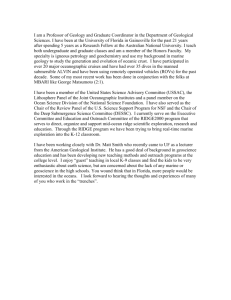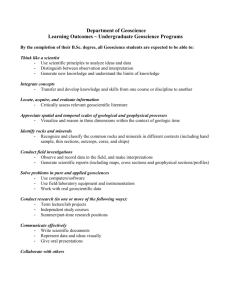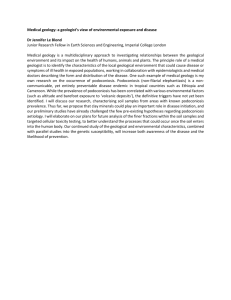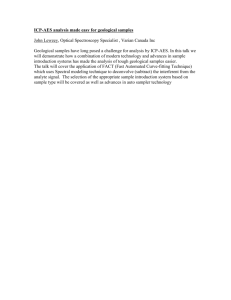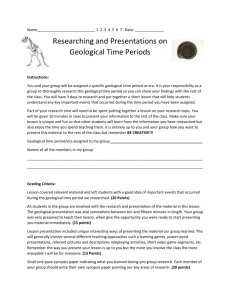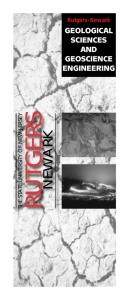Department of Geological Sciences Strategic Plan 2005 – 2015
advertisement
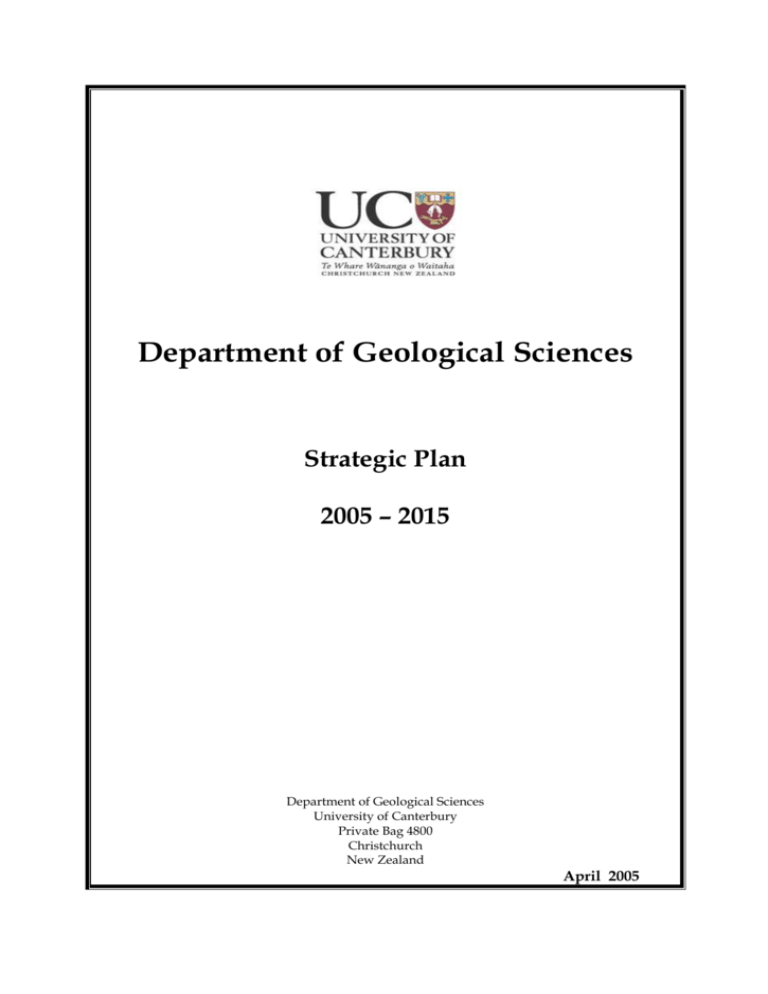
Department of Geological Sciences Strategic Plan 2005 – 2015 Department of Geological Sciences University of Canterbury Private Bag 4800 Christchurch New Zealand April 2005 Statement of Strategic Intent The Department of Geological Sciences will establish and maintain a reputation as an international centre of high quality in both research and scholarship, and teaching and learning. Department of Geological Sciences - Strategy Statement 1. CONTEXT The Department of Geological Sciences is at a turning point. The good 2003 PBRF outcome has put us in the limelight on a national if not an international basis. We presently have sufficient reputation (emphasised by PBRF), highly experienced staff and confidence to be able to take decisions on future staffing and research strategy that will enable us to grow to well above our present subcritical mass. Success in this will lead to significantly greater student numbers and quality of education; greater staff capability to initiate and support substantial research projects; and increased research income and research outputs. Once well established on that pathway, continued growth will be relatively easy. By contrast, if we do not take the forward-looking decisions; if we instead focus only on consolidating our present work, without positively pushing into potential growth areas – there is a serious danger that we shall slowly but surely lose ground, lose EFTS, lose (more) staff and become a second rate unit. Such a decline would not be a good result for the Department but neither would it be for the College of Science to which we look for support in our growth strategy. 2. MISSION The Department of Geological Sciences will establish and maintain a reputation as an international centre of high-quality in both research and scholarship, and teaching and learning, in the geosciences. In the particular areas of research, education and external relationships, the following statements are agreed: 1. Research: The Department of Geological Sciences will actively seek to lead in strategic research programmes that: increase understanding of Earth System structure and behaviour train students in the methods and techniques of research contribute to meeting New Zealand’s needs for sustainable resource development, environmental quality and hazard management lead to high-quality research publications collaborate with selected national and international partners in academia, research organisations and industry integrate knowledge and concepts across the disciplines of Earth System science 2. Education: The Department of Geological Sciences will evolve strategic educational methods that develop student learning and critical thinking skills, through studentcentred attitudes and increasing use of: an Earth System science and management context problem-orientated student learning modern technology partnerships with other organisations leading to a broad and balanced understanding of the Earth Sciences. 3. External Relationships: the Department of Geological Sciences will actively foster strategic external relationships that: contribute to public awareness and understanding of Earth System science contribute to scholarship in education and research contribute to the sustainable development of society contribute to environmental quality generate income and students. recognise the Department’s responsibilities as custodian and provider of fundamental Earth Sciences information, particularly that relevant to New Zealand. To achieve the vision the Department of Geological Sciences will need to: 1. Produce students who: are independent learners and thinkers have a broad and balanced understanding of the Earth Sciences are excellent communicators are systems thinkers are proven problem-solvers in Earth System science are technologically confident and up-to-date are versatile and adaptable 2. Make best use of our specific advantages in education and research with respect to: our geographic position within an advanced society on an active plate boundary in the Roaring Forties the availability of the latest technology our interrelationships with other disciplines (especially engineering and geography) the tradition and continued relevance of excellent field-based geology our 2003 PBRF score 3. Engage and retain carefully-chosen staff of the highest calibre who are: enthusiastic committed innovative productive adaptable excellent communicators scholars in education and research 3. STRATEGIES Research Strategy The focus of the departmental research is the geological history, dynamics and processes operating around Pacific rim, with special emphasis on New Zealand and the southwest Pacific. Within this broad focus we foresee continued and increasing research potential in five overlapping fields: 1. Pacific Rim Tectonics: research on processes, past to present, at active margins ranging from arc magmatism through basin formation to terrane accretion, with special emphasis on determination of tectonic evolution and holistic geology by the application of a range of integrated geological techniques applied to New Zealand and the Pacific rim. 2. Active tectonics and landscape evolution: research designed to lead to an understanding of active faulting and folding processes in surface and near surface settings (particularly those associated with the New Zealand plate boundary), and their influence on geomorphology. 3. Geological Hazards and Disaster Management: The assessment, mitigation and management of seismic, volcanic, land instability, flooding, coastal hazards, and resulting disasters. Paleoenvironments and Paleoclimates: New Zealand’s southern, mid-latitude, oceanic setting uniquely supports research on questions of global climate and ocean circulation in the Quaternary, and to longer term changes of environment and paleobiology related to progressive isolation. 5. Applied and Environmental Geoscience: research in the fields of engineering geology/geomorphology, environmental geoscience, and near surface geophysics directed at maintaining and enhancing infrastructure, sustainable use of resources and the interface between the Earth and society. 4. Each of the above programmes have potential for research growth. Each of the above research programmes feeds directly into the Department’s teaching programme. Education strategy The department favours a Geoscience System approach that integrates learning across many Earth Sciences through a focus on processes. Our objectives are: To produce graduates capable of analytical thinking, with the ability to assess received wisdom, and to work with complex and incomplete data sets To provide a broad-based understanding of Planet Earth for all students and to bring an improved understanding of geosciences to the wider community To prepare B.Sc. Hons, M.Sc and Postgraduate Diploma graduates for professional employment in the fields of geology, engineering geology, hazard and disaster management, and environmental science To produce outstanding Ph.D graduates in our key research fields. To increase EFTS at both undergraduate and postgraduate levels RESEARCH & SCHOLARSHIP Strategic goal To maintain our position as the leading national university research department and build our international reputation for research and scholarship in Geoscience. Milestones Short term 2005/6 Yr 0 – 1 Medium term 2006/7 – 2009/10 Yr 2 – 5 Develop and implement a focussed strategic research plan involving staff , capital equipment and facilities and with national and international strategies. Move towards an interdisciplinary approach to research Seek and obtain increased external research funding. Develop outward looking, internationally collaborative culture. Maximise PBRF outputs and encourage enhancement of PBRF grades through support and mentoring. Develop strategic staffing approach to support the key Departmental research programmes. Develop strategic links with other Departments in the University of Canterbury. Develop strategic links with the Institute of Geological & Nuclear Sciences, other CRIs and other external research organisations. Operate a rolling capital equipment plan for large and medium cost research equipment. Develop staff career progress to ensure stability of research groups/foci. Grow postgraduate (Masters and PhD) student enrolment. Replace the existing XRF spectrometer with major new analytical equipment more appropriate to research in environmental geoscience. Undertake the progressive refurbishment of research facilities and laboratories within the Department. Long term 2009/10 – 2014/15 Yr 6 - 10 Have academic staff who are internationally renowned for research and recognised by honours and awards. Have technical staff who are integral to the Department’s research activities, are highly skilled and motivated, and whose outstanding contributions are recognised by awards. Influence governmental and national strategies for the Earth Sciences. Establish new cutting-edge, strategically important, research facilities within the Department. TEACHING & LEARNING AND THE STUDENT EXPERIENCE Strategic goal To provide a high quality, holistic student experience and a high quality learning environment based on an integrated Geoscience System approach. Milestones Short term 2005/6 Yr 0 – 1 Medium term 2006/7 – 2009/10 Yr 2 – 5 Enhance the student experience by developing and creating student involvement in the activities of the Department and the College, and via internal and external geoscience societies. Add significant value to our students by taking into account the needs of stakeholders to maximise students’ employment prospects. Provide better guidance for students in deciding their University options. Prepare a marketing strategy to increase student numbers at both undergraduate and postgraduate level. Continuously review the portfolio of Geoscience courses to better use our resources. Bring high quality Erskine Fellows and other visitors to the Department to support the teaching and learning programme. Improve the teaching facilities and environment within the Department for the benefit of both students and staff. Contribute significantly to the Colleges’s Science Outreach programme. Develop strategies to increase Maori and Pacific Island intake and encourage these students to continue to graduate studies. Develop senior students mentoring junior students as a key facet of the Department learning environment. Increase student involvement in the running of the Department. Investigate the feasiblity of provision of 100 level courses in Nelson and/or other remote locations. Market the Department as a place to study because of its research excellence. Develop strategies to grow the intake of international students at undergraduate and postgraduate levels adding to the culture and diversity of the Department. Long term 2009/10 – 2014/15 Yr 6 - 10 Students will see the Department as the premier place of choice to study Geoscience in New Zealand. ORGANISATION & MANAGEMENT Strategic goal The organisation and management structure is appropriate and effective for the delivery of the Department’s strategic plan. Milestones Short term 2005/6 Yr 0 – 1 Develop an open, honest and inclusive management and leadership style that is effective in the delivery of the strategic plan. Facilitate the further development of departmental strategies. Increase the visibility of the Department within the University as a whole. Undertake succession planning for HOD and Departmental Executive appointments. Increase staff morale by sound management. Medium term 2006/7 – 2009/10 Yr 2 – 5 Enhance interactions between departments and diminish departmental and college silos. Develop a team approach that engenders a spirit of working for the University, College and Department rather than self. Initiate constructive discussions, driven by teaching and research considerations, with the Department of Geography, the College of Science and other relevant stakeholders concerning the establishment of a School of Earth & Environmental Studies Long term 2009/10 – 2014/15 Yr 6 - 10 Operation of a stable Departmental organisational structure that facilitates good management. The management style and structure is supportive and inclusive of all staff in the Department. Maximise the abilities and skills of all staff in the Department. The Department of Geological Sciences will be integrated within a multidisciplinary School of Earth & Environmental Studies. STAFFING Strategic goal Maintain a high quality, diverse staff to deliver and underpin research and teaching of the highest calibre. Milestones Short term 2005/6 Yr 0 – 1 Recruit high quality new staff in order to achieve the Department’s strategic goals. Appoint a new academic staff member in our first priority strategic research area of Environmental Geochemistry. Appoint in 2006 a new academic staff member in the core discipline of crystalline petrology. Develop a transparent work allocation for Department academic staff. Develop a plan to address gender and ethnic imbalance. Enhance the performance review process for all staff in order to support their career development. Develop succession planning for future HOD appointments. Undertake a gap analysis of technical and administrative expertise in the Department and develop a strategic plan to address deficiencies. Ensure that the essential contributions made by technical staff to research and teaching objectives are recognised within and outside the Department. Medium term 2006/7 – 2009/10 Yr 2 – 5 Develop procedures to better utilise adjunct appointments and Visiting Erskine Fellowships Develop a rolling postdoctoral scientist programme that increases the number of research fellows and provides periodic refreshment of personnel. Develop strategy for joint appointments with CRIs and industry stakeholders. Appoint in 2007/8/9 new academic staff members in strategically important research and teaching areas. Increase the number of academic staff in response to growth in EFTS and income. Develop a strategic plan for the recruitment of additional technical staff . Long term 2009/10 – 2014/15 Yr 6 - 10 Strategic staffing policy with career progression planning and career development for all. Make significant progress to achieve gender balance in Departmental staffing. Have well motivated and professional staff who are acknowledged leaders in their fields. FINANCES Strategic goal To meet our annual financial goals as agreed with the College of Science and to use funds responsibly and in accord with Departmental strategic planning. Milestones Short term 2005/6 Yr 0 – 1 Develop more high-level financial expertise within the Department Finance Committee. Medium term 2006/7 – 2009/10 Yr 2 – 5 Develop appropriate influence and relationship with key research funders. Develop a priority-based CAPEX process. Fund research through collaboration with industry, CRIs, the service sector, and other Universities. Complete the 2006 budget process in keeping with College guidelines. Increase international funding. Continue to monitor spending and develop good financial management in the Department, supported by the good accounting practices of the College . Increase the amount of external research funding. Obtain scholarships to support more postgraduate students. Develop a research funding strategy. Assess and invest in appropriate new initiatives. Have a healthy positive balance to enable reinvestment in the Department. Long term 2009/10 – 2014/15 Yr 6-10 Be financially viable and strong in order to contribute to the successful operation of the University, the College of Science, and the Department. TREATY OF WAITANGI Strategic goal The Department will benefit from good relationships with Maori Milestones Short term 2005/6 Yr 0 – 1 Promote and maintain good relationships with Ngai Tahu. Develop and contribute to courses that are attractive and relevant to Maori students. Increase staff awareness and understanding of Maori issues and the Treaty of Waitangi. Have frequent interactions with our Maori students in order to support them and address their specific needs. Medium term 2006/7 – 2009/10 Yr 2 – 5 Long term 2009/10 – 2014/15 Yr 6 - 10 Develop strategy for increasing Maori students at undergraduate and postgraduate levels. The Department will have a good interaction with Maori and as a result will have more Maori students. Develop research of Maori interest. Maori will be aware of Department activities and objectives. Promote Maori Earth Scientists into academic positions at Canterbury and elsewhere. EQUITY & DIVERSITY Strategic goal The Department will develop an inclusive and supportive culture based on equity Milestones Short term 2005/6 Yr 0 – 1 Identify and address any Equity issues within the Department. Gender Equity considerations will be a high priority in making all future staff appointments. Support staff in order to minimise the negative impact of particular family situations or health on their profesional duties. Medium term 2006/7 – 2009/10 Yr 2 – 5 Formulate Departmental policies and procedures in line with the University’s Equity & Diversity plan. Increase the proportion of women on the academic staff. Increase the proportion of women holding senior academic rank within the Department. Develop a system to achieve more equitable workloads amongst staff. Ensure that students of minority cultures and ethnic backgrounds are fully included in the activities of the Department. Long term 2009/10 – 2014/15 Yr 6 - 10 Achieve an equitable and diverse culture within the Department that is supportive of both staff and students. COMMUNITY ENGAGEMENT Strategic goal The Department will engage in the local and national community at all levels. Milestones Short term 2005/6 Yr 0 – 1 Increase local awareness of Departmental activities and the Geoscience discipline. Develop good relations with The Press and other media. Develop interaction with the local community by contributing speakers to lecture programmes. Develop Geoscience-orientated Outreach activities directed towards local schools and teacher organisations. Play a significant role on the activities of national Geoscience, Environmental and Science organizations. Assist the College of Science in promulgating Science education and research Develop a Departmental Alumnus strategy in conjunction with the College and University. Medium term 2006/7 – 2009/10 Yr 2 – 5 Develop strategic links with Christchurch City and ECAN Councils, and with other local and national stakeholders. Develop links with the Industry Community and service sector. Develop specific links with local schools. Make press releases on all possible favourable Departmental activities. Strengthen links with Outreach Secondary Schools and develop links through Outreach with Primary Schools. Encourage staff members to contribute to debate and activities at local, national and international level. Long term 2009/10 – 2014/15 Yr 6 - 10 Either directly or through the College of Science the Department will be seen as a centre of excellence and activity. Through the various community engagement activities, external stakeholders will recognise the value and importance of Geoscience , locally and nationally. Establish and develop strategic links to appropriate international communities.
